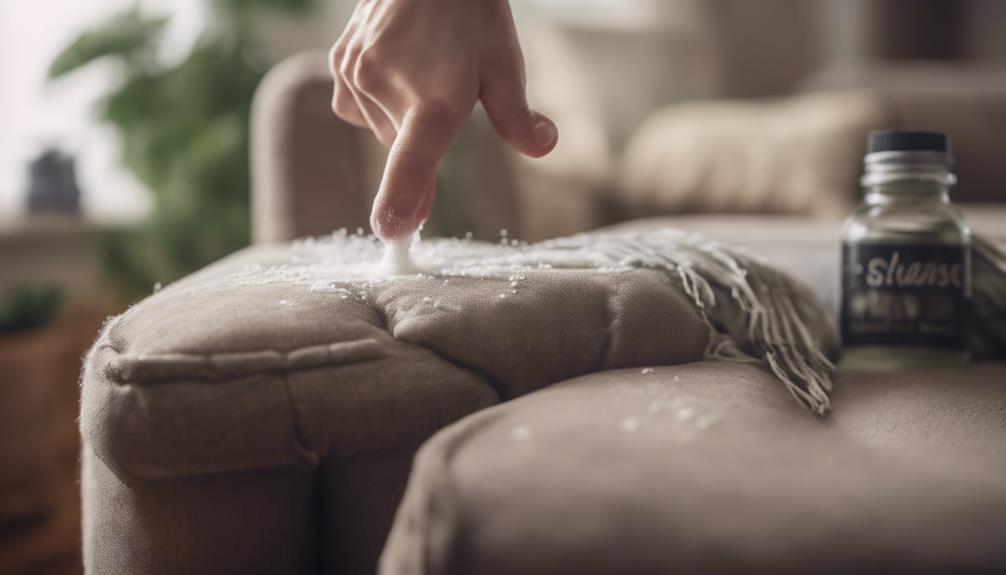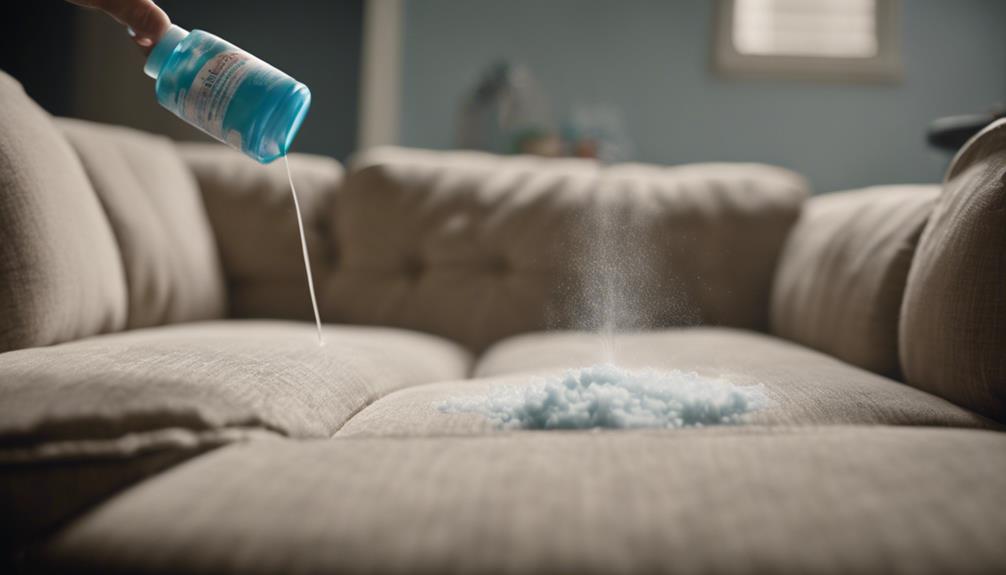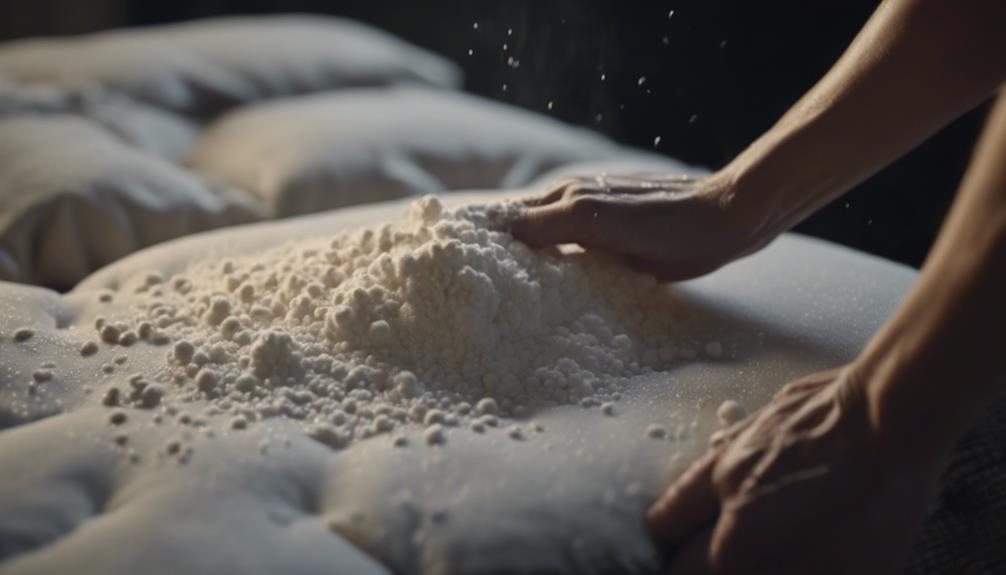Freshen your couch easily with a homemade deodorizer. Mix water, vinegar, and fabric softener for a potent solution that revives your upholstery. Add favorite essential oils for a personalized scent. Remember to test on a small area first and let it air dry completely. For safe fabrics like cotton and polyester, this cost-effective and eco-friendly solution is perfect. Enjoy benefits like reduced odors and a healthier home. Opt for citrus oils for invigorating scents or woody ones for warmth. Experiment with blends to find your perfect fragrance. Enhance your space effortlessly with this DIY deodorizer.
Benefits of Homemade Couch Deodorizer
Homemade couch deodorizer offers a cost-effective and eco-friendly solution for freshening up your upholstery. Opting for a DIY approach not only saves you money but also contributes to a greener environment by avoiding the chemicals present in store-bought alternatives.
When it comes to your upholstery, DIY deodorizers provide a natural and safe way to eliminate odors without causing harm to delicate fabrics. The use of essential oils in homemade solutions allows you to tailor the scent to your liking, adding a personal touch to your deodorizing routine.
Unlike commercial products that often mask odors temporarily, DIY deodorizers work to neutralize and remove unpleasant smells at their source. By choosing a homemade couch deodorizer, you not only keep your upholstery fresh and clean but also promote a healthier and more sustainable living environment.
Essential Ingredients for DIY Spray
To create a DIY upholstery spray, gather essential ingredients like water, vinegar, fabric softener, and optional essential oils. Here are the key components you'll need:
- Water: Acts as the base for the spray to dilute other ingredients and guarantee uniform distribution on the upholstery.
- Vinegar: Helps in eliminating odors and disinfecting the fabric, leaving your couch smelling invigorated.
- Fabric Softener: Adds a pleasant scent to the upholstery, making it more inviting and cozy.
Fabric softener not only contributes to a delightful aroma but also helps in softening the fabric fibers. When combined with vinegar and water, it creates a potent yet gentle solution for reviving your upholstered furniture.
Choosing the Right Essential Oils

When selecting essential oils for your homemade couch deodorizer, consider your favorite scents and the aromatherapy benefits you desire.
Different oils like lavender for relaxation, citrus for freshness, or peppermint for antibacterial properties can enhance your DIY spray.
Blend oils to create a personalized fragrance that suits your preferences and effectively eliminates odors from your upholstery.
Scent Selection Tips
For the best scent selection when creating your homemade couch deodorizer, consider incorporating essential oils like lavender, tea tree, or eucalyptus known for their natural deodorizing properties.
When choosing the right essential oils for your DIY upholstery spray, keep these scent selection tips in mind:
- Citrus Oils: Citrus oils such as lemon or orange can provide an invigorating and uplifting scent to your homemade couch deodorizer.
- Woody Scents: Consider using woody scents like cedarwood or sandalwood to add a warm and grounding aroma to your upholstery spray.
- Floral Essential Oils: Floral essential oils like rose or jasmine can create a calming and pleasant atmosphere in your living space.
Experiment with different essential oil combinations to find the perfect scent that suits your preferences and enhances the deodorizing effect of your homemade couch spray.
Aromatherapy Benefits
Consider incorporating essential oils like lavender, eucalyptus, and lemon for their deodorizing and calming properties when selecting the right aromatherapy benefits for your homemade couch deodorizer. Lavender is widely known for its relaxing scent that can help reduce stress and promote better sleep.
Eucalyptus not only freshens the air but also has antibacterial properties, making it an excellent choice for eliminating odors. Lemon oil provides a clean and uplifting aroma, perfect for creating a fresh environment in your living space.
If you're looking to tackle germs and musty smells, peppermint and tea tree oils are ideal with their antibacterial and antifungal properties. Citrus oils like orange and grapefruit can uplift your mood and provide a burst of energy.
For a deeper cleanse, consider using rosemary and sage oils, known for their purifying and cleansing effects. Experiment with different essential oil blends to find the perfect combination that suits your preferences and achieves the desired deodorizing effects in your home.
Step-by-Step Mixing Instructions
To create the homemade couch deodorizer, start by combining distilled water, vodka, essential oil, baking soda, and fabric softener in a spray bottle.
Follow these steps to guarantee a well-mixed deodorizer:
- Measure Ingredients: Pour 1 cup of distilled water, 1/4 cup of vodka, 10 drops of essential oil, 1 tablespoon of baking soda, and 1 tablespoon of fabric softener into the spray bottle.
- Shake Thoroughly: Secure the spray bottle lid and shake the mixture vigorously for about a minute to blend all the ingredients evenly.
- Ready for Use: Your homemade upholstery deodorizer is now ready to use.
Spray a small amount on a test area first, then apply lightly over the fabric. Allow it to air dry completely before sitting on the furniture.
Testing on a Small Area

Before applying the homemade couch deodorizer to your entire upholstery, it's prudent to first test it on a small, inconspicuous area to validate compatibility and prevent any potential damage. Take a small amount of the deodorizer mixture and apply it to a hidden spot on your couch. Allow it some time to dry completely. If there are no adverse reactions like discoloration or damage, you can proceed with confidence to deodorize the rest of your upholstery.
To conduct the test, mix a bit of rubbing alcohol with the deodorizer solution and dab it onto the chosen area. Gently rub the mixture into the fabric and let it sit for a while. Afterward, check for any negative effects on the material. This simple step can save you from ruining your entire couch and give you peace of mind when using the homemade deodorizer.
Safe Fabrics for Application
When considering safe fabrics for applying homemade upholstery spray, opt for materials like cotton, polyester, microfiber, and linen.
Avoid using the spray on delicate fabrics such as silk, velvet, or leather to prevent any potential damage.
Always test a small, inconspicuous area first to confirm the spray is compatible with the fabric before proceeding with full application.
Fabric Compatibility
Safe fabrics for applying homemade couch deodorizer include cotton, polyester, nylon, and microfiber, as they're less likely to be damaged by the deodorizing process.
When considering fabric compatibility for deodorizing your couch, it's crucial to make sure the spray or softener used won't harm the material. Here are some key points to keep in mind:
- Avoid Delicate Fabrics: Steer clear of applying deodorizers on delicate fabrics like silk or velvet, as they may be more prone to damage.
- Check Manufacturer's Instructions: Always refer to the manufacturer's label for cleaning instructions before using any homemade deodorizer to prevent any adverse effects on the fabric.
- Test Before Application: Prior to applying the deodorizer, test a small, inconspicuous area of the fabric to confirm compatibility and avoid any unintended damage.
If uncertain about the fabric type or the suitability of the deodorizer, seek advice from a professional upholstery cleaner to guarantee the safety of your couch fabric.
Material Considerations
For optimal outcomes, choose fabrics such as cotton, polyester, microfiber, or linen when using homemade couch deodorizer. These materials are safe and effective for deodorizing your couch without causing damage.
Avoid using deodorizers on delicate fabrics like silk, velvet, or leather as they may not respond well to the ingredients. Before applying the deodorizer, test a small, inconspicuous area of the fabric to confirm compatibility and prevent any unwanted reactions.
Natural fibers like cotton and linen are excellent choices as they can absorb and retain the fresh scent of the deodorizer. Consider the fabric's reaction to moisture and the ingredients in the deodorizer to preserve its quality and appearance over time.
Benefits of Using Fabric Softener

Fabric softener offers several benefits for your fabrics, including reducing static cling and wrinkles while adding a pleasant scent.
Here are some advantages of using fabric softener:
- Reduction of Static Cling: Fabric softener helps to prevent the build-up of static electricity in your fabrics, making them feel smoother and more comfortable against your skin.
- Wrinkle Reduction: By using fabric softener, you can help loosen the fibers in your clothing and upholstery, which can reduce the appearance of wrinkles and make ironing easier.
- Pleasant Fragrance: One of the most noticeable benefits of fabric softener is the addition of a delightful scent to your fabrics, leaving them smelling fresh and inviting.
Regular Application Tips
To maintain a fresh and clean scent on your couch upholstery, remember to apply the homemade deodorizer sparingly and test it on a small area first for compatibility before full application. Use a glass spray bottle for easy application and guarantee even distribution.
After spraying, allow the deodorizer to air dry completely before using the couch to prevent any potential staining issues. It's crucial to repeat the application every few weeks or as needed to keep the upholstery smelling fresh.
Keep in mind that the homemade deodorizer is safe for most fabric types, but always avoid using it on leather or suede materials to prevent any damage. If you're unsure about how the deodorizer will react with your specific couch fabric, conduct a patch test first.
Avoiding Leather and Suede Upholstery

If you have leather or suede upholstery, steer clear of homemade sprays with vinegar, alcohol, or essential oils to prevent damage.
These materials demand specialized care beyond what DIY solutions can provide.
Stick to manufacturer-recommended products to maintain the quality of your leather and suede furniture.
Non-leather Deodorizer Tips
When deodorizing your non-leather upholstery, make sure to choose a gentle homemade solution to avoid damaging your furniture. Here are some tips to effectively freshen up your furniture without harming non-leather materials:
- Use a Spray Bottle: Mix your deodorizing solution in a spray bottle for easy application. This helps evenly distribute the deodorizer without saturating the upholstery.
- Test in an Inconspicuous Area: Before applying the homemade deodorizer to the entire piece of furniture, test it in a hidden spot. This guarantees that the solution is safe to use and won't cause any unwanted reactions on the upholstery.
- Allow for Proper Drying Time: After applying the deodorizer, allow your non-leather upholstery to dry completely before using the furniture. This helps prevent any moisture-related damage and ensures the deodorizer has effectively freshened up your furniture.
Suede Care Advice
Carefully manage the upkeep of suede upholstery to prevent damage and maintain its luxurious appearance. When it comes to suede care, avoid using DIY solutions or generic upholstery sprays, as suede can be sensitive to certain cleaning agents. Opt for specific care products designed for suede to guarantee the texture and color remain intact. DIY solutions may lead to discoloration or damage, compromising the overall look of your suede furniture.
If deep cleaning is required, consider professional cleaning services to avoid any mishaps. Following manufacturer guidelines for cleaning and care is essential in preserving the quality of your leather and suede upholstery. Remember, investing time and effort into proper suede care will prolong the life of your furniture and keep it looking elegant for years to come.
Achieving a Fresh Living Space
To achieve a fresh living space, regularly using homemade couch deodorizer can help maintain a clean and pleasant environment. Incorporating DIY techniques with essential oils can elevate the ambiance of your home effortlessly.
Here are three key ways to enhance your living space with homemade deodorizers:
- Natural Ingredients: Utilize ingredients like vodka, essential oils, and baking soda to create a cost-effective and environmentally friendly deodorizing spray for your couch. These ingredients work together to neutralize odors and leave a fresh scent behind.
- Fabric Safety: Guarantee that the homemade deodorizer is safe for the specific fabric of your upholstery. While DIY sprays are generally suitable for most fabrics, avoiding using them on leather or suede is crucial to prevent any damage.
- Consistent Use: By incorporating homemade deodorizers into your cleaning routine, you can consistently keep your living space smelling fresh and inviting. Regular use of these sprays can help eliminate lingering odors and maintain a welcoming atmosphere in your home.
Conclusion
To sum up, by utilizing a homemade couch deodorizer with essential oils and fabric softener, you can effortlessly rejuvenate your living space and maintain your furniture smelling fresh.
With just a few basic ingredients and consistent application, you can create a warm and welcoming ambiance in your home.
So why not give it a try and witness the impact it can have in your living room? Your couch will appreciate it!